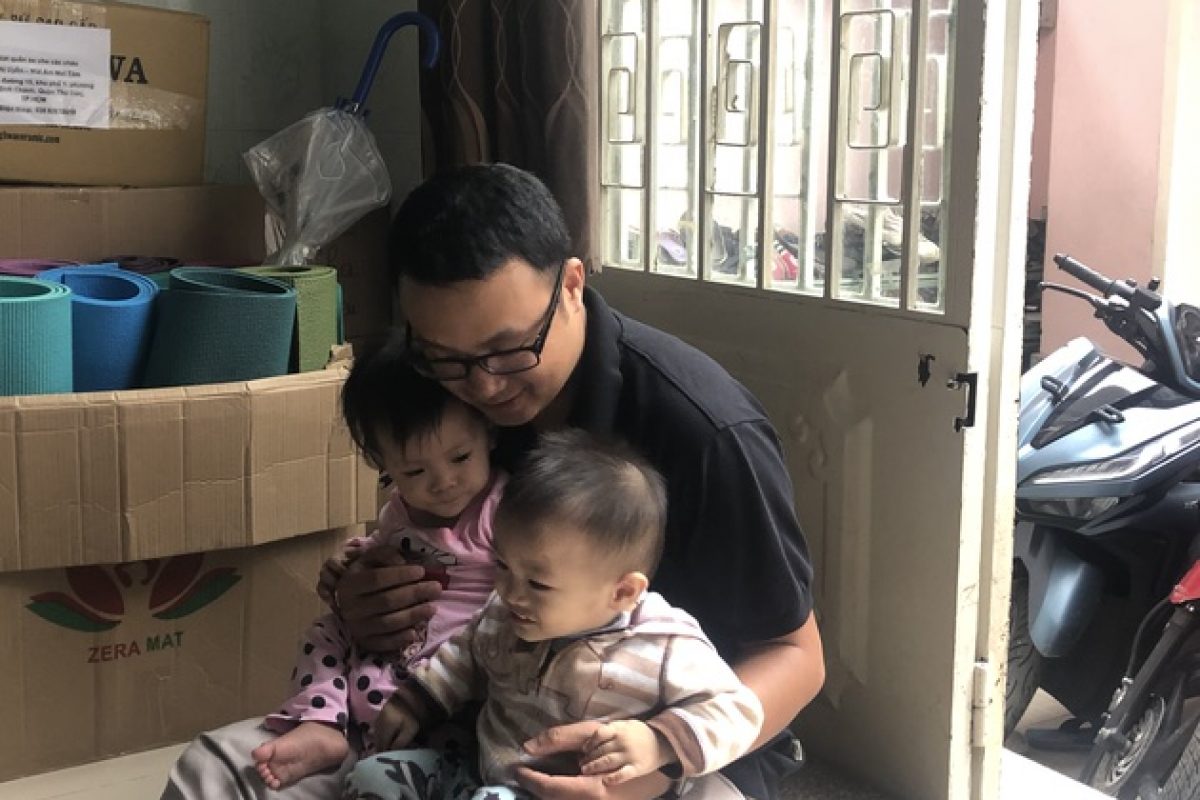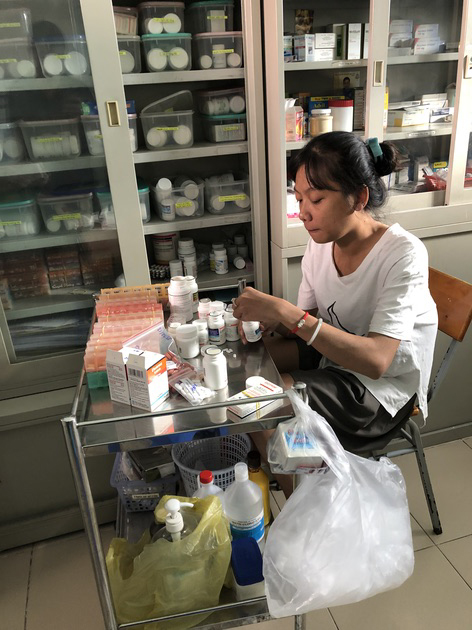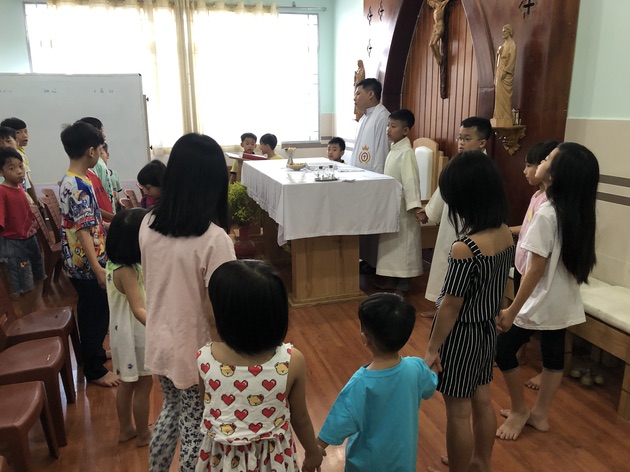The Church’s Role in Providing for Victims of HIV in Southeast Asia

“I feel that I am very dirty because of all the men who used me.” In the shower, Linh scrubs herself hard, so hard that it leaves scars on her body, as she tries to remove the feeling of having been soiled.
Linh was 14 when her mother, seeking financial gain, forced her into prostitution. By the age of 16, Linh was pregnant from one of her abusers and had contracted HIV. Shamed and abandoned by her family, lacking the financial resources to provide for a child and afraid that she would transmit her infection to him, she considered abortion.
“She was already four months pregnant, and the clinic was asking for a lot of money,” Father John Toai recalls. “People referred her to our shelter. I told her that I could not offer her money for an abortion, but that I could provide her with medicine and a place to stay and have her child.”
Fr. Toai is the founder and director of the Mai Tam House of Hope in Ho Chi Minh City, Vietnam. He shared his experience at a workshop on the role of faith-based organizations engaged in addressing HIV among migrant and refugees that took place in Geneva from 20-21 February 2019. The workshop was organized by the World Council of Churches and facilitated by the International Catholic Migration Commission.
Since 2005, Fr. Toai’s shelter has been offering medicine, food and psychosocial care to HIV-positive women and orphaned children. It also provides educational and income-generating opportunities to its residents.
Most of the women living in the shelter are widows who contracted HIV from their husbands. Others are survivors of sex trafficking who were sold in China. Many are undocumented ethnic minorities whose lack of legal status means that for Vietnamese law enforcement and healthcare systems, they don’t exist.
The women and the older children care for the young. The shelter currently assists 460 people whose lives are affected by HIV.
The Church’s Role in Ensuring Sustainable Assistance
From 2006 to 2013, Fr. Toai recalls that many programs for people living with HIV were funded in Vietnam. But as international funding for HIV-related projects dwindled, many programs were shut down. “So people were left to themselves, no one cared for them. They had nowhere to go and they came to the Church,” he says.
The nature of faith-based organizations means that they are there to stay. Church programs depend on volunteers, on its members and on the sharing of their resources, Fr. Toai explains.
His assessment is echoed by Mr. Augustin Tual Sian Piang, Health Program Manager with Karuna Mission Social Solidarity, the Catholic Bishops’ Conference of Myanmar’s social arm, who also spoke at the workshop.
In recent years, many international non-governmental organizations ceased their activities in Myanmar, leaving a gap that public healthcare has been unable to fill. This disproportionately affects the poorest, often in the most rural areas of the country. They frequently turn to faith-based organizations for care and support, notably to the Sisters of St. Joseph and the Sisters of the Good Shepherd.
HIV, Migration and Human Trafficking

Both in Vietnam and in Myanmar, there is a strong correlation between women in migration, human trafficking and HIV. Young women are promised a desirable job far from their homes, where they are trafficked into prostitution, coerced into domestic work or forced to marry. Those who escape are left undocumented with no means to return, and often turn to survival prostitution, increasing their risk of contracting HIV.
In the case of Myanmar, the promised jobs are generally in Thailand or China. Mr. Piang tells the story of Nan, a young woman from a rural region of Myanmar. She used the services of a local broker to find a job as a domestic worker in Thailand, only to find herself in slave-like working conditions. Nan was confined to the house in which she worked, was underfed, and never received a salary.
Nan escaped from her employer after two months, but was tricked into prostitution by an acquaintance who promised her a job. She was eventually arrested for working illegally in Thailand and was deported to Myanmar. She was four months pregnant at the time, and not yet aware that she was HIV-positive.
Nan returned to her village, where she now provides for her family through a pig-raising project supported by the Karuna Mission. Sadly, due to the lack of resources for HIV detection, she was only diagnosed as HIV-positive after having transmitted the disease to her son. The Karuna Mission and its partners now provide treatment for both of them.
Mr. Piang says that although faith-based organizations do excellent prevention and treatment work in Myanmar, their lack of reporting resources restricts their access to funding. In turn, this greatly limits their activities, especially in more remote areas.
Although HIV prevention and access to treatment have made significant strides in Myanmar in recent years, certain sections of the population remain at very high risk of contracting HIV. In some regions, the incidence of HIV-positivity among migrants is as high as 18%, as compared to 0.7% among Myanmar’s tested adult population.
International organizations and local NGOs agree that human trafficking is on the rise across Southeast Asia, including in Vietnam and Myanmar, and that victims are increasingly young. More and more, predators use social media to attract girls and force them into prostitution. This tendency is generalized across the region, which accounts for one-third of all women and children trafficked worldwide.
No numbers are available for HIV prevalence among victims of sex trafficking, but it is clear that sex workers are at a much higher risk of contracting HIV. In Vietnam, female sex workers have an HIV-prevalence of 2.8%, in comparison to 0.3% in the general adult population.
Beyond Medical Treatment: Restoring Hope

House of Hope founder Fr. Toai is also the program director of the Pastoral Care for People Living with HIV/AIDS Program of the Ho Chi Minh City Archdiocese.
A committed group of religious and lay men and women are involved in providing care and support for people with HIV through the program. They do outreach to prisons and drug detention centers, where many HIV-positive people are incarcerated.
For the past 15 years, the Church has been creating awareness around the issue. “I will say that now in our Church there is a lot of compassion and empathy for people with HIV. People infected feel welcomed and accepted,” says Fr. Toai.
The Church community provides care and material support to those suffering from HIV. However, Fr. Toai says, a main reason people come to them is to seek spiritual guidance.
“The religious sisters and priests talk to them, listen to them and also provide counseling and spiritual accompaniment and help them reconcile with their God and with themselves,” Fr. Toai says. He notes that people often need reconciliation with their past and with anger and resentment.
“If we as a Church accompany them and empower them and help them get through this crisis, they will recover their dignity and feel confident again. They will regain their power.”
As for Linh, she still lives at the House of Hope, which provides her with antiretroviral treatment. The shelter also provided the prophylactic medicine necessary for her to give birth to her child without transmitting the infection.
“I will not become like my mother who sold her daughter,” she says. “I will take care of my son because now he is safe from HIV.”
Migrants seeking to improve their living conditions and refugees fleeing dreadful situations often become vulnerable to human traffickers. For this reason, anti-trafficking is a primary focus area for the International Catholic Migration Commission (ICMC). ICMC advocates for anti-trafficking measures and supports grassroots initiatives that reduce migrants’ risks of falling prey to traffickers. Learn about ICMC Europe’s efforts to create cooperation among civil society actors and the government in Guinea to fight human trafficking as well as about its awareness-raising seminars on the risks of irregular migration in Senegal.
All names of people living with HIV have been changed to protect their identities.